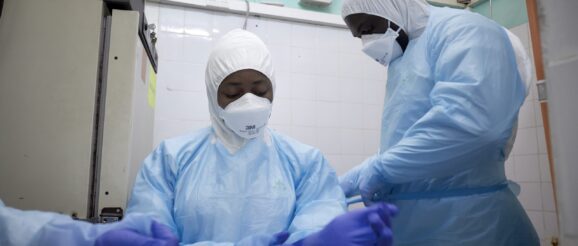Nigeria should invest in research, innovation

NIGERIA’S abysmal contribution to global research, particularly in tropical diseases and medicine, was brought recently into focus by stakeholders at a forum, where they bemoaned the country’s failings despite its ample supply of manpower. Aggregating the concerns of experts, a professor at Rutgers University, United States, Olabode Ibironke, noted that the prevalence of some tropical diseases in Nigeria should have motivated significant domestic research in them to benefit the country and mankind. The federal and state governments should move beyond rhetoric and invest heavily and sustainably in research and development.
Ibironke noted, “Nigeria should be to sub-Saharan Africa what the US is to the western world. It should be a leader in research, innovation, and culture. That is already happening in the realm of culture. It makes little sense that Europe and the US are leading in tropical medicine and neglected tropical diseases.”
R&D explains Investopedia, “is an important driver of economic growth as it spurs innovation, invention, and progress.” Cairn Info, a French-Belgian online resource platform, says, “Besides social responsibilities such as health care, education, pension schemes and many others, governments pay attention to the role of R&D for securing long term competitiveness and thus engendering economic growth and employment.”
The world’s successful economies therefore invest heavily in research, Nigeria should do so too. Notably, societies pour research funding in the social, health and economic sectors that pose challenges to them. For instance, the US government, non-profits, and corporations invest heavily in ICT, cancer, diabetes, and trauma research among others, in response to the challenges these pose to their economies, for global competitiveness, and to improve citizens’ health.
But Nigeria’s failure to accord priority to R&D in tropical diseases for instance has led to the persistence of malaria, schistosomiasis, leprosy, tuberculosis, Ebola, Lassa fever, and Marburg virus disease, among other TDs in the country.
Yet, Nigeria has produced many researchers that have benefitted several other countries of the world. Therefore,the government should invest heavily in R&D, and utilise the knowledge of its innovators for development in all spheres.
Science and technology hold the key to national development, and are essential to improving the quality of life, wealth creation, and in the economic growth and transformation of the country. They help to improve agriculture, health, energy, education, water supply, poverty alleviation, environmental sustainability, and rural development.
In the 1980s, Nigeria made attempts in deploying financial resources to and building a national strategy on scientific research. But over the years, this has been abandoned by successive governments in favour of empty rhetoric.
Despite a pledge in 2015 by the President, Major General Muhammadu Buhari (retd.), to increase investment in research, science and technology, the Tertiary Education Trust Fund has said Nigeria invests only 0.02 per cent of its revenue on the sector. This is grossly low to bring change about.
In January, the government said it “will henceforth dedicate 0.5 per cent” of GDP to R&D to fast-track meaningful development. It had made the same promise in 2021. No concrete action has been taken. To meet national aspirations of being among the world’s top 20 economies, funding and effective policies should be directed to science, technology, and innovation.
In 2019, the Executive Secretary of TETFund, Suleiman Bogoro, described allocations to the sector as “very dismal and unacceptably low.” He pointed out: “In most of the developed world, it is 3.0 percent to 5.0 percent, and nearly 10 percent in more serious, technologically-driven economies.”
Not surprisingly, the top R&D spenders are also the richest countries, led by the US, China, Japan, Germany, France, and the United Kingdom. Significantly, India, South Korea, Taiwan, Russia, and Brazil were ranked fourth, sixth, ninth, 10th and 11th respectively on a list of 90 top spenders on research prepared by Britain’s Royal Society. R&D helped South Korea and Taiwan to rise and retain their leading export economies status, while the three others are among the five emerging economies referred to as BRICS, the other two being China and South Africa. Unfortunately, Nigeria did not even make the list of 90!
Some other African countries know better and have increased their R&D expenditure. Between 2017 and 2018, South Africa grew its gross R&D expenditure to R38.7 billion from R35.6 billion, according to UNESCO. Mauritius, Egypt, Rwanda, and Tunisia also increased their funding in 2019.
But in that year, Nigeria allocated only $175 million as the entire budget of the Ministry of Science and Technology, which was about 0.757 percent of the federal budget.
In the Global Economy 2020 ranking of 67 countries on R&D, Israel had the highest value of expenditure (5.4 percent). South Korea was second in the rank (4.81 percent); the US fifth (3.4 percent), China 12th (2.4 percent) and Canada 19th (1.7 percent).
The Asian Tigers are not far behind. In 2020, Taiwan’s R&D funding was approximately $719 billion. Hong Kong in 2021 spent around $27.83 billion, according to Statista. In 2021, Malaysia spent more than $9 billion on R&D, projected to increase to more than $10 billion the following year.
The federal and state governments should channel their resources into research in the agriculture, industry, and science sectors. There is no lack of Nigerian researchers across various fields. The government should learn to properly utilise the country’s human capital just as other countries are benefitting from the intellectual and material contribution of Nigerian researchers working abroad.
There must be a synergy between the universities, research institutes and the private sector; governments at all levels need to harness the research from the Ivory Tower and think tanks to tackle national challenges.
Going forward, Nigeria should remove bureaucracy from its public research institutions. Creating research institutes without an attendant number of researchers available in them should be jettisoned. There should also be close collaboration with the private sector to revive the country’s comatose research institutes and make them impactful to national development.
